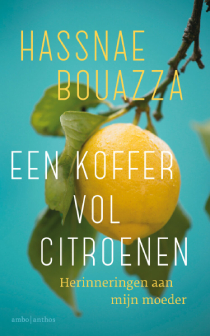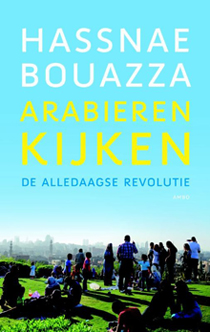‘Western neo-colonialism empowers Islamic extremism’
Tayfun Balçik

Scène uit The Last Temptation of Christ
Last month blogger and historian Tayfun Balçik interviewed Bangladeshi writer and activist Parvez Alam in front of a live audience as part of the The Hague Peace Projects. Alam is an expert in the history of Islam, especially the historical development of Islam. During the talk (read the first installment the second and the third), several subjects were explored, like the perception of Islam in the West.
In the West there is a right-wing motivated idea about the Islam as an inherently evil and violent ideology, and that all Muslims are potential terrorists. What do you think of this? And should Muslims distance themselves from extremism?
“It’s absurd to think that Muslims can have anything inherent; I don’t even want to answer such a question.”
They claim Muslims to be backward and traditionalist.
“We can talk about this, is Islam more prone to terrorism? No it’s not. Just look at the Bible and the Old Testament. It has narratives of genocide, killing children and even cattle. God, in the Old Testament, is telling you to commit ethnic cleansing. So just because you have violent verses in the Quran or in the Hadith, I don’t think Islam promotes violence.”
Okay, clear. But why do you think this discourse persists in the West?
“I don’t think it’s an inherently Western thing. But there has always been a right-wing racist streak in Western poltics. That’s the problem with Western liberalism, its not devoid of an idea of Western exceptionalism and supremacy. You know we had Obama, and everybody had the idea of him as a calm person, rational, and a Nobel Prize winner for peace. But on the other hand he bombed countries all over the world. He also expelled thousands of immigrants from America. He did. For us, its all the same. What’s the point of having a liberal president in America if their policy is the same as that of the conservatives? Anyway, as I was saying, racism has always existed in the West. It never went away. By the way, the recession is an important factor here. People feel insecure and afraid. And then it’s always easy, when people are out of jobs, to point at a scapegoat and give yourself over to xenophobia.”
If you look at the chaotic situation in the Middle East now, and you also talked about the chaos in the early period of Islam, do you think that old violence still resonates now, or do you think its more a matter of imperialism, with the US selling weapons to all those warring factions in the Middle East?
“Obviously both. If you look at the Arab Spring, I’m a big supporter of the Arab Spring movements. We also had one in our country. We called it the Bangla Spring. I was a part of it. It’s the same story everywhere, the dictators won. The thing is, what frustrated me at the time, I mean, in Europe the French Revolution is called a glorious thing, the whole idea of a secular state came into being then, a libertarian state.”
The instigators of the Arab Spring were terrorists, right?
“Well, it was violent, right, there was mob justice, I acknowledge that, but the secularists in the Middle-East and in countries like Bangladesh, they can’t have their French Revolution because of the West.”
What do you mean?
“The West created so many things. They have their business and have a lot to say about the East, about Bangladesh, Syria and many other countries. There was a time of colonization. And now we have a time of neo-colonialism. We obviously don’t have the same kind of influence in Western countries that the Western countries have on us. It’s not like they are always doing it forcefully, although sometimes they do. But the relationship is not equal. In paper, all the sovereign states in the world are equal, but in reality they are not. This inequality prevents secular and liberal revolutions in the East and empowers Islamic extremism.”
Remark from the audience: I have the feeling sometimes that Muslims see themselves only as victims, that Islamophobia is also the result of how Muslims behave.
“Muslims in the West do have a responsibility to show that they are distinct from the extremists. Not only in the West, everywhere where Muslims live, they have an obligation to do that. I know that it sounds bad. Just because a crazy guy somewhere staged an attack, I have to say sorry, but if we look now, at where we have come now, it has become a responsibility. Because there are people who call themselves the Islamic State, and they are taking your space of Muslim representation.”
Of course I feel this responsibility, but the difficulty is that it is asked from a position of power to a person who is powerless, and that’s the main frustrating thing. But still I think we have this responsibility.
Remark from the audience: if you look at Europe, including the Ottoman empire, sexuality used to be very fluid. But that changed under the influence of the West.
“There is some influence of the West, like in my country, on the Bengali culture, where traditionally the women were more vocal, even after Islamisation, there were a lot of female poets, and in the Bengali literature they were the central figures, freely expressing themselves and also writing without shame about their sexuality. Islam didn’t change that. It’s the Victorian era in the West which curtailed this freedom. The Victorian era was a very repressive period in English history, especially towards women with regards to their sexuality.”
Tayfun Balçık is a historian, specialized in the modern history of Turkey and Amsterdam-West, one of the project-coordinators of the Turkish-Kurdish dialogue program at The Hague Peace Projects and he gives Dutch language lessons to Turkish elderly people. He has a Facebook-page.
English, Tayfun Balçik, 16.04.2017 @ 10:18
10 Reacties
op 16 04 2017 at 11:03 schreef Sorry dat ik wit ben:
Alweer zo’n goed stuk van Tayfun!!!
op 16 04 2017 at 16:05 schreef MNb:
“the difficulty is ….”
Je bent niet geheel machteloos. Kijk maar naar Hassnae. Die heeft ondubbelzinnig duidelijk gemaakt dat ze geweld van extremistische moslims afkeurt. Wie dan nog niet tevreden is heeft een probleem, niet zij.
Vergelijk het met voetbalsupporters. Moet ik als fan van FC Twente nou echt nog luidkeels verkondigen wat ik van de drugshandel in vak P vindt?
op 16 04 2017 at 21:11 schreef Sasha Berkman:
MNb, maar wat vind jij van een van de gevolgen van het westerse imperialisme op mensen die zich niet wensen te onderwerpen aan het moorddadige westerse imperialisme en die daarom constant worden aangevallen met rare frames over islamieten en terrorisme? Het is overduidelijk dat het de westerse imperialistische politiek is die aan de basis ligt van de “islamistische reactie” toch?
op 18 04 2017 at 02:15 schreef Kshatriya:
@ Sasha Berkman
Zou je een voorbeeld kunnen geven van westers imperialisme dat nog steeds in effect is in niet-westerse landen?
op 18 04 2017 at 17:59 schreef Dennis:
Het is overduidelijk dat het de westerse imperialistische politiek is die aan de basis ligt van de “islamistische reactie” toch?
Sasha Berkman is gewoon een domme kut
op 18 04 2017 at 20:55 schreef Sasha Berkman:
Beste Kshatriya, ik zeg alleen maar Irak.
Dennis, is Dennis.
op 20 04 2017 at 07:04 schreef Kshatriya:
Alleen maar Irak. Nou, dan zijn we dus klaar. Dank je.
op 22 04 2017 at 16:19 schreef Sasha Berkman:
Nee, niet alleen maar Irak, dat zeg ik niet.
op 23 04 2017 at 07:08 schreef Kshatriya:
De Arabieren in India, was dat wellicht ingefluisterd door ‘Westers’ kolonialisme?
op 23 04 2017 at 19:51 schreef Sasha Berkman:
Nee, dat was onderdeel van een groot moslim-complot.







 RSS
RSS